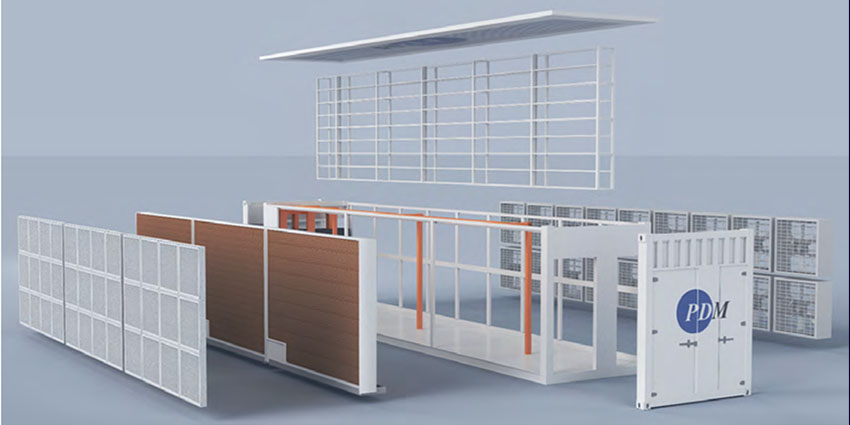There is often confusion between the terms “data center containers” and “modular data centers.” While both involve modular approaches, data center containers typically refer to ISO-standard shipping containers used to house data center infrastructure, whereas modular data centers encompass a broader range of prefabricated, scalable solutions that may include various types of modules and configurations..
A data center container is a specific package engineered and delivered in an ISO shipping container. It is a self-contained unit that houses data center infrastructure.
In contrast, a modular data center refers to a deployment method and engineered solution for assembling a data center using modular components, often through prefabricated solutions that enable scalability and a rapid delivery schedule.
While a container is not the same as a modular data center, a container can be part of a modular data center. In this context, a container might serve as a component within a larger modular data center deployment.
Data Center Container
A data center container is a product that integrates customized infrastructure for power, cooling, or housing IT equipment racks within an ISO (International Standards Organization) intermodal shipping container. These containers provide a self-contained, transportable solution for data center needs, leveraging the standard dimensions and durability of ISO containers.
Modular Data Center
Modular data center design refers to an approach that involves either a prefabricated data center module or a deployment method for delivering data center infrastructure in a modular, rapid, and flexible manner.
Today’s Trends in Modular Data Centers
To clarify terminology around container and modular data centers, Jason Schafer from The 451 Group categorized the types of modular solutions available:
- Modular Providers
- Modular Components
- Container
- Phased Approach
“Modular data centers have evolved from a niche solution for limited situations to a more common and standardized approach for data center construction,” said Joe Kramer, Director of Modular Data Center at Schneider Electric, in an interview with Data Center Knowledge. “In the hyperscale and colocation data center market, there is an unprecedented need to scale capacity rapidly. This demand is driving providers to invest in modular power and cooling solutions.”
The survey also found that modular data centers facilitate expansion and upgrades. 43% of respondents indicated that modular data centers are best suited for expanding existing data centers, while 39% said they are ideal for upgrades or retrofits.
Of the four categories, only three meet the definition for modular. The fourth type, a phased approach, may be conceived of as modular in that it is built-out gradually, but is not truly modular.
Modular 1.0
Several innovations marked the inception of modular products and concepts:
- Google experimented with a container filled with IT equipment, placed in an underground parking garage. They even explored the idea of a floating data center on cargo ships.
- In 2006, Sun Microsystems introduced Project Blackbox, an energy-efficient, water-cooled turnkey data center housed in a shipping container.
- By 2008, Microsoft announced plans for its new Chicago data center, capable of accommodating up to 220 shipping containers.
Following the initial development of containers, theories evolved and the hype cycle unfolded for the concept of a “data center in a box.” Numerous hardware vendors, independent companies, and data center providers embraced the modular concept and introduced their own engineered solutions.
Additional Modular Data Center Resources
- The State of the Modular Data Center
- DCK Guide to Modular Data Center Design
- The Modular Data Center Market: A DCK Guide
- Why Consider a Modular Data Center? A DCK Guide
- Modular Data Center Due Diligence: A DCK Guide
- Modular Data Centers: Practical Use Cases for Your Enterprise

